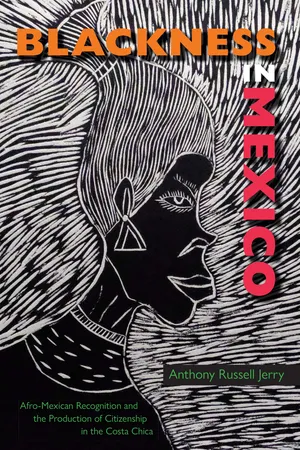
Blackness in Mexico
Afro-Mexican Recognition and the Production of Citizenship in the Costa Chica
- English
- ePUB (mobile friendly)
- Available on iOS & Android
Blackness in Mexico
Afro-Mexican Recognition and the Production of Citizenship in the Costa Chica
About this book
An up-close view of the movement to make “Afro-Mexican” an official cultural category
Through historical and ethnographic research, Blackness in Mexico delves into the ongoing movement toward recognizing Black Mexicans as a cultural group within a nation that has long viewed the non-Black Mestizo as the archetypal citizen. Anthony Jerry focuses on this process in Mexico’s Costa Chica region in order to explore the relational aspects of citizenship and the place of Black people in how modern citizenship is imagined.
Jerry’s study of the Costa Chica shows the political stakes of the national project for Black recognition; the shared but competing interests of the Mexican government, activists, and townspeople; and the ways that the state and NGOs are working to make “Afro-Mexican” an official cultural category. He argues that that the demand for recognition by Black communities calls attention to how the Mestizo has become an intuitive point of reference for identifying who qualifies as “other.” Jerry also demonstrates that while official recognition can potentially empower African descendants, it can simultaneously reproduce the same logics of difference that have brought about their social and political exclusion.
One of few books to center Blackness within a discussion of Mexico or to incorporate a focus on Mexico into Black studies, this book ultimately argues that the official project for recognition is itself a methodology of mestizaje, an opportunity for the government to continue to use Blackness to define the national subject and to further the Mexican national project.
A volume in the series New World Diasporas, edited by Kevin A. Yelvington
Publication of this work made possible by a Sustaining the Humanities through the American Rescue Plan grant from the National Endowment for the Humanities.
Frequently asked questions
- Essential is ideal for learners and professionals who enjoy exploring a wide range of subjects. Access the Essential Library with 800,000+ trusted titles and best-sellers across business, personal growth, and the humanities. Includes unlimited reading time and Standard Read Aloud voice.
- Complete: Perfect for advanced learners and researchers needing full, unrestricted access. Unlock 1.4M+ books across hundreds of subjects, including academic and specialized titles. The Complete Plan also includes advanced features like Premium Read Aloud and Research Assistant.
Please note we cannot support devices running on iOS 13 and Android 7 or earlier. Learn more about using the app.
Information
Table of contents
- Cover
- Title Page
- Copyright Page
- Dedication
- Contents
- List of Illustrations
- Acknowledgments
- Introduction: Citizenship and Black Recognition in Mexico
- 1. Chasing Blackness: Racial Geography and a Methodology for Locating Blackness in Mexico
- 2. Dark Matter, Ideology, and Blackness in the Conceptualization of Mestizaje
- 3. Recognizing Culture and Making Difference Official
- 4. Citizenship, Black Value, and the Production of the Black Subject in Mexico
- 5. A Black Subject Position and Narrative Representations of Blackness in the Costa Chica
- Conclusion: Black Visibility and the Limits of Black Recognition in Mexico
- Notes
- References
- Index
- New World Diasporas